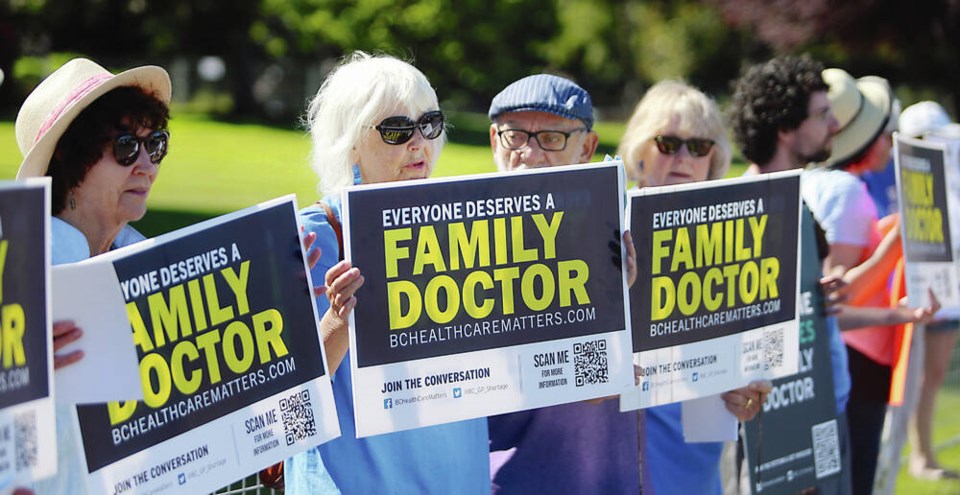I recently moved back to Victoria, a world-class elite city, so imagine my surprise when I discovered third-class access to health care under all that lovely foliage.
In order to get a simple annual blood test and renew a prescription, I visited and contacted a number of clinics, to no avail. No one takes new patients in Victoria.
Despite the word “Urgent” in their name, James Bay Urgent and Primary Care Clinic has no walk-in clinic and instructed me to “try another clinic.”
Lining up early at the Downtown Urgent and Primary Care Clinic early is not enough: we must call a number posted on the door, which kept being cut off and the door attendant suggested it could take 100 attempts but even then, it may not lead to an appointment, and again suggested to “try another clinic.”
The Esquimalt Urgent and Primary Care Clinic had already given all their appointments by 8:55 a.m. as there is only one doctor who sees only 10 or 15 patients a day; again, told to “try another clinic,” but when the attendant looked at Medimap there were no appointments left that day, so she suggested Telus Health MyCare.
Telus Health MyCare requires downloading an app on a cellphone. which I cannot do. I suggested that Telus, a large profitable corporation, could afford to hire a few technicians to allow access to their online service on regular laptops, and I was informed that it is not a technical issue but “their concept.”
Inclusivity? But Maple Telemedicine, an Ontario company the B.C. government pays for online consultations for B.C. residents, is available online through regular laptops but they only have chat boxes, and everything is done through chat typing: Maple Telemedicine does not believe in phones.
A 10-minute conversation took 30 minutes of chat typing; one doctor admitted to being in the middle of an emergency room shift. Efficiency?
Until recently, B.C. Medicare paid for consultations on Maple between 10 a.m. and 6 p.m., which is reduced to consultations between 10 a.m. and 2 p.m.
The reason for the cut? Dealing with increased demand.
How is cutting hours by half to deal with increased demand logical? Apparently, this is B.C. Medicare’s decision to restrict the hours.
It is hard to believe that Health Minister Adrian Dix is not supporting privatization of health care when he cuts by half the hours in which B.C. residents can access Maple telemedicine consultations paid by the province.
And Maple says nothing about this change on their website, so after 2 p.m. the only option is to pay $49 for the consultation. I tried at 10 a.m. the next day, but after waiting 75 minutes for a requisition for a test required by a lab after a previous test, the doctor who reviewed my file cancelled my appointment without communicating with me and told me to see a physician in person.
Back to chat box people, and they suggested to try two or three more times in case another doctor agreed to a consultation. After another two-hour wait, I finally got the precious requisition so I could phone the lab and make an appointment for the follow-up test.
After tests, where are the results? Well in B.C., for someone without a primary health-care provider, it is a patchwork of online registrations: with Island Health for Telus Health MyCare test results; with MyCareCompass for tests done with LifeLabs; and with B.C. Services for immunizations. Even doctors in B.C. told me that B.C. record-keeping is fragmented and haphazard.
Since I arrived in Victoria, I have read and listened to various media reports, programs, webinars etc., and have noted the dissatisfaction of young doctors, some of them mentioning spending all day with sick people and feeling depressed when they get home; they would love to find it “fun” to go to work.
My previous physician in Nova Scotia loved his work and found it “fun” to be a physician. We hear it is about the shortage of doctors, yet I also hear a) numerous B.C. doctors only want to work 2½ or three days a. week; b) the College of Physicians and Surgeons of B.C. not allowing doctors who studied in the U.S. universities and worked as doctors in the U.S. to practise in B.C. without an enormous amount of extra education and tests, etc.
The politicians offer self-congratulatory press conferences about their obsession with Urgent and Primary Care Centres, even though in Victoria two closed and two others function at 30 per cent of capacity. Looks like politicians’ wilful blindness and deafness to the corporatization of B.C.’s health care. In addition, aside from “try another clinic,” a constant refrain is “Sorry, I cannot do anything.”
Although my sample is very small, we seem to have landed in a society of disempowered educated people who are nice and polite, but not interested in what is not immediately their job/benefit, and seem to exercise little critical thinking and engagement in trying to understand the (non) system they work in.
Abdication of responsibility? Isn’t it what political philosopher Hannah Arendt called the “banality of evil” — people who stick closely to their immediate tasks and ask no questions, or provide answers that are illogical and lack substance?
It is hard to imagine — and being excited about — aging. What to say about the possibility of being sick in such a situation?
>>> To comment on this article, write a letter to the editor: [email protected]



